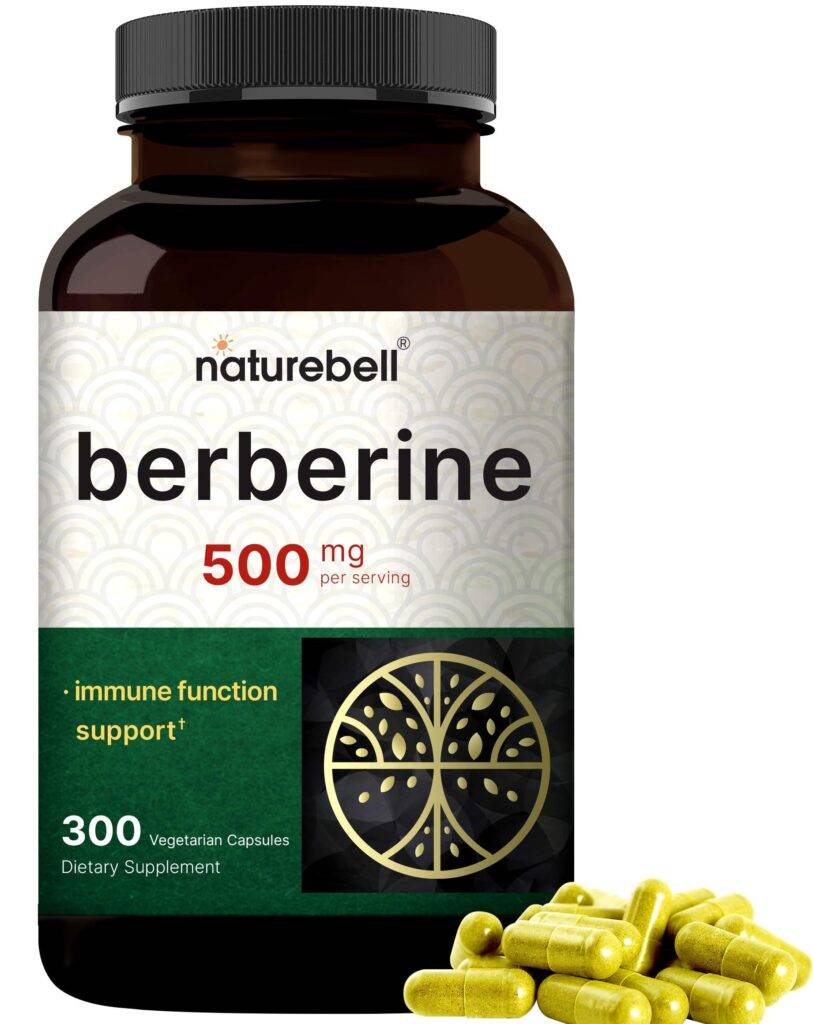In the quest for effective weight loss solutions, a natural compound has surfaced from the depths of conventional herbal medicine: berberine. Extracted from the roots and stems of various plants, including barberry and goldenseal, this golden-hued alkaloid has captured the attention of health enthusiasts and researchers alike. With a history steeped in ancient practices and a modern resurgence fueled by scientific inquiry, berberine is heralded not just for its potential weight loss benefits but also for its broader impact on metabolic health. As the body of research grows, so too does the curiosity surrounding how this humble compound might provide the key to unlocking weight management for those struggling to shed excess pounds. In this article, we will delve into the mechanisms of action of berberine, explore its effects on weight loss, and sift through the evidence to determine whether it truly holds the promise it appears to offer.
Table of Contents
- Understanding Berberine and Its Role in Weight Management
- The Science Behind Berberine: How It Affects Metabolism
- Exploring Berberine’s Impact on Blood Sugar and Appetite control
- Integrating Berberine into Your Weight Loss Regimen
- Combining Berberine with Diet and Exercise for Enhanced Results
- Potential Side Effects and Precautions When Using Berberine
- Real-Life Success Stories: Berberine and Sustainable Weight Loss
- Choosing the Right Berberine Supplement: What to Look For
- Consulting Healthcare Professionals: A Guide for Safe Use
- Future Research directions: The Evolving Landscape of Berberine Studies
- Q&A
- Closing Remarks
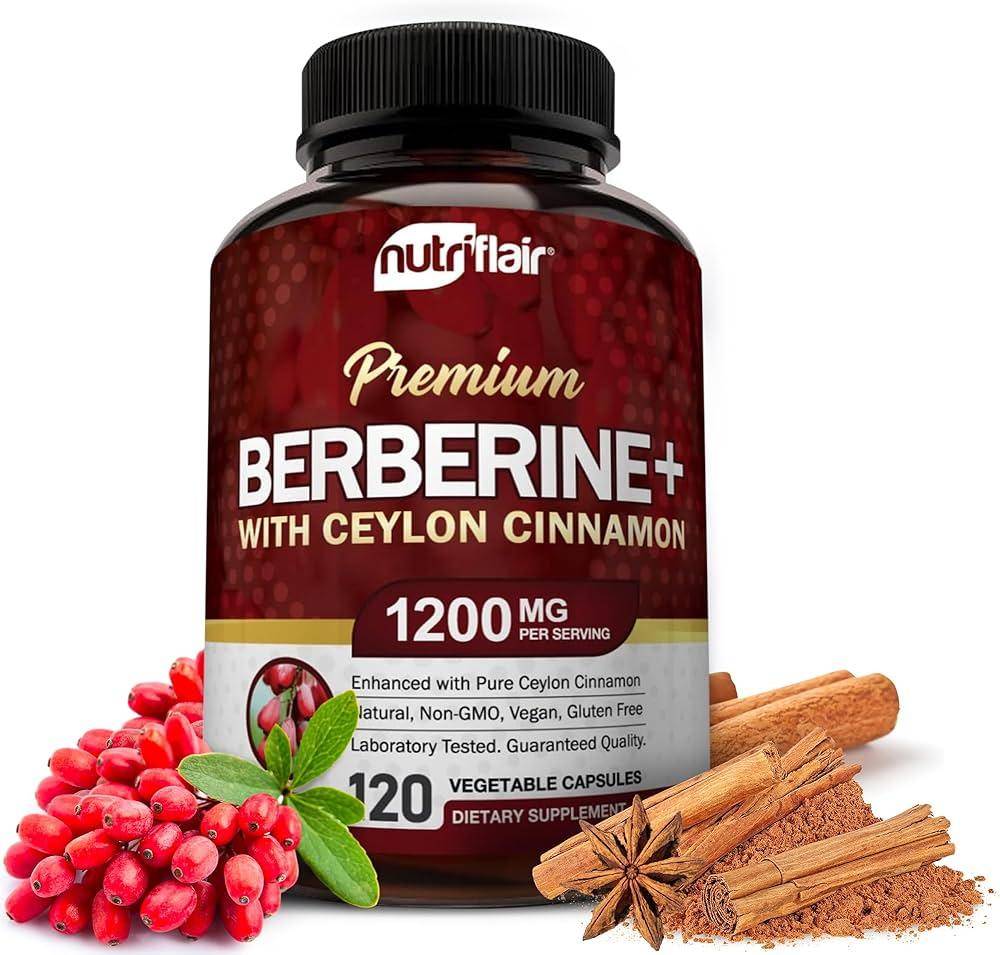
Understanding Berberine and Its role in Weight Management
Berberine is a natural compound derived from various plants, including the roots of Berberis species.This shining yellow alkaloid has attracted attention in recent years for its potential health benefits, particularly in the realm of weight management. Research indicates that berberine may aid weight loss by optimizing metabolic processes in the body, making it a noteworthy ally for those seeking to shed excess pounds.
One of the mechanisms through which berberine promotes weight loss is its ability to enhance insulin sensitivity. By improving how the body responds to insulin, berberine helps regulate blood sugar levels, which can, in turn, reduce cravings and stabilize energy. This is crucial for maintaining a healthy weight as erratic blood sugar levels often lead to unhealthy snacking and overeating.
Additionally, berberine has been shown to influence gut health favorably. A balanced gut microbiome is integral for effective digestion and nutrient absorption. By fostering the growth of beneficial bacteria, berberine may address issues such as inflammation and digestive irregularities that can hinder weight loss efforts. This enhancement of gut health creates a more favorable environment for metabolic function.
Moreover, berberine has been found to play a role in regulating lipid metabolism.By lowering the production of cholesterol and triglycerides in the liver, it promotes a healthier lipid profile, which can be a vital aspect of weight management. In studies, subjects taking berberine have reported reductions in fat storage and improved fat breakdown.
| Benefit | Impact on Weight Management |
|---|---|
| Improves Insulin Sensitivity | Reduces cravings and stabilizes energy levels |
| Enhances Gut health | Promotes effective digestion and nutrient absorption |
| Regulates Lipid Metabolism | Reduces fat storage and improves lipid profile |
| Reduces Inflammation | Supports overall health and weight loss |
Ultimately, while berberine presents a promising option for weight management, it is indeed essential to view it as a part of a extensive approach that includes balanced nutrition and regular physical activity. its benefits can complement a healthy lifestyle, helping individuals reach their weight loss goals more effectively. As always, consulting a healthcare professional before introducing a new supplement is advisable to ensure it aligns with personal health needs.
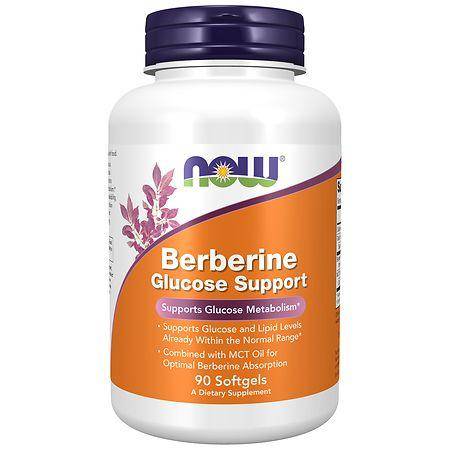
The Science Behind Berberine: How It Affects Metabolism
Berberine, a powerful compound found in various plants, has gained important attention for its ability to influence metabolism. This natural alkaloid primarily affects metabolic pathways by activating an significant enzyme known as AMP-activated protein kinase (AMPK). When activated, AMPK serves as a cellular energy sensor that helps regulate various metabolic functions, including glucose uptake, fat oxidation, and overall energy balance.By enhancing cellular energy metabolism, berberine may support weight loss and improve metabolic health.
Research indicates that berberine can lead to numerous beneficial outcomes for those seeking to shed pounds. Among its various effects, berberine has been shown to:
- decrease blood sugar levels: By enhancing insulin sensitivity and promoting glucose uptake in cells, berberine can effectively lower fasting blood sugar levels.
- Reduce fat accumulation: The compound inhibits fat cell formation by regulating genes involved in adipogenesis, which may help prevent weight gain.
- Enhance lipid metabolism: Berberine encourages the breakdown of fats, resulting in lower triglyceride and cholesterol levels.
Studies have revealed that berberine can lead to significant weight loss, especially when combined with a healthy diet and regular physical activity. In one clinical trial,participants who incorporated berberine into their routine experienced an average weight loss of approximately 5-10% of their body weight over several months. These findings highlight berberine’s efficacy as a weight management supplement,supporting metabolic rate elevation and fat loss.
Moreover, berberine’s unique mode of action extends beyond weight loss alone; it plays a crucial role in metabolic syndrome management. By addressing key risk factors, such as obesity, insulin resistance, and dyslipidemia, berberine can reduce the likelihood of developing type 2 diabetes and cardiovascular diseases. Understanding its multifaceted effects helps to appreciate berberine not just as a weight loss aid, but as a holistic approach to improving metabolic health.
Ultimately, while berberine presents numerous advantages for metabolism and weight management, it is indeed essential to combine its use with lifestyle changes for optimal results. Adopting a balanced diet rich in whole foods, alongside regular exercise, can amplify the positive effects of berberine. those considering berberine supplements should engage with healthcare professionals to tailor a suitable approach, ensuring optimal efficacy and safety in their weight loss journey.
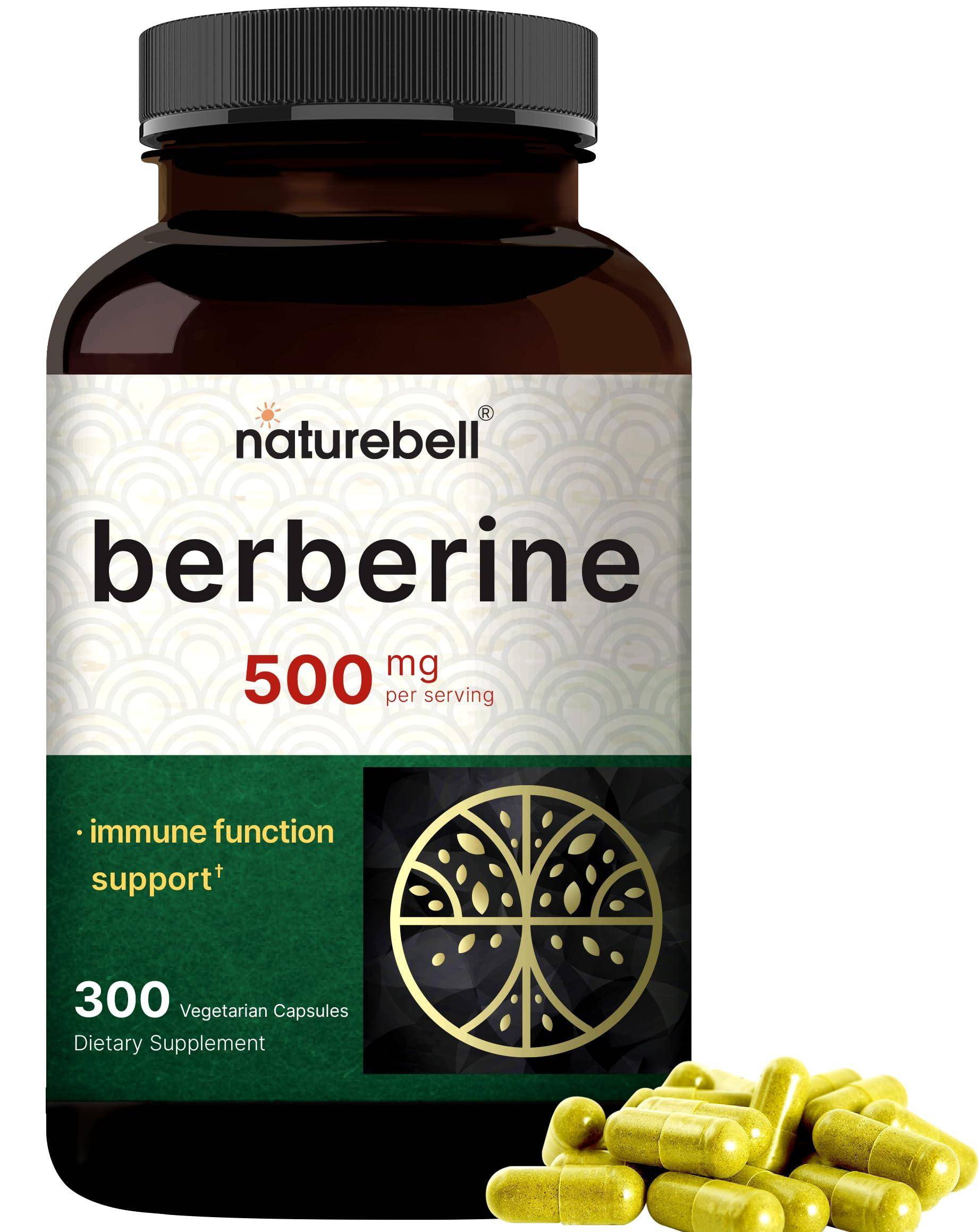
Exploring Berberine’s Impact on Blood Sugar and Appetite Control
One of the primary ways berberine affects blood sugar is by enhancing insulin sensitivity.By improving the body’s response to insulin, berberine helps facilitate glucose uptake in cells, leading to lower blood sugar levels.This action can be particularly beneficial for individuals with insulin resistance or type 2 diabetes. Additionally, studies have shown that berberine may positively affect the gut microbiome, possibly leading to better glucose metabolism.
Another significant aspect of berberine’s role in appetite control relates to its impact on hormones. Research indicates that berberine might help regulate hormones such as leptin and ghrelin, which are pivotal in hunger and satiety signals.By maintaining balanced levels of these hormones, individuals may experiance reduced cravings and an enhanced ability to control portion sizes, contributing to weight loss efforts.
Moreover, the regulation of fat metabolism is another area where berberine shines. This compound may promote the breakdown of fats and help prevent the formation of new fat cells. Some studies suggest that berberine can inhibit adipogenesis, the process by which pre-adipocytes turn into fat-storing cells, ultimately leading to a healthier body composition.When coupled with a balanced diet and exercise, berberine can serve as a valuable supplement for those aiming to shed excess weight.
Incorporating berberine into a wellness routine may offer benefits beyond just blood sugar and appetite regulation. Individuals considering this natural supplement should consult healthcare professionals to determine the appropriate dosage, as well as ensure it aligns with their health needs. As with any supplement, a holistic approach, including diet and lifestyle changes, remains critical for achieving sustainable weight loss and improved overall health.
Integrating Berberine into Your Weight Loss Regimen
can be a game changer, especially when combined with healthy lifestyle choices. Berberine, a bioactive compound found in various plants like goldenseal and barberry, has garnered attention for its potential to aid in weight management. When considering its incorporation into your routine, focus on how it can complement other weight loss strategies.
To effectively include berberine in your diet, consider these simple tips:
- Consult a healthcare professional: Before starting any supplement, it’s crucial to discuss with a doctor, especially if you have underlying health issues or are on medication.
- Choose the right form: Berberine is available in various formats, including capsules and powders. opt for a form that fits your lifestyle and dietary preferences.
- Incorporate a balanced diet: Focus on whole foods rich in nutrients, and use berberine to enhance the effects of your dietary choices.
Many find success by pairing berberine use with intermittent fasting or a low-carb diet.Studies suggest that berberine may help regulate blood sugar levels,promoting fat loss,especially in individuals struggling with metabolic syndrome. Including berberine during fasting periods can enhance its fat-burning capabilities and improve insulin sensitivity. You can create meal plans that integrate these aspects seamlessly.
For optimal results, timing and dosage can also play significant roles. Consider the following recommendations for berberine usage:
| Time of Day | Recommended Dosage |
|---|---|
| Before meals | 500 mg |
| Twice Daily | 1000 mg |
| With a high-carb meal | 1000 mg |
Lastly, while berberine is effective on its own, its powers multiply when coupled with lifestyle modifications. Regular exercise, stress management practices, and adequate sleep are essential components of a comprehensive weight loss plan. By fostering a holistic approach, you can maximize the benefits of berberine and achieve your weight loss goals more efficiently. Remember, success is not solely about the supplement; it’s about creating a sustainable lifestyle.
Combining Berberine with Diet and Exercise for Enhanced Results
Integrating berberine into a comprehensive approach that includes a balanced diet and regular exercise can considerably amplify its weight loss benefits. Berberine works by activating the enzyme AMP-activated protein kinase (AMPK), which plays a crucial role in energy metabolism. When combined with dietary modifications, you can optimize its effects, leading to better weight management and overall health improvements.
Dietary choices play a vital role in maximizing the benefits of berberine. aim for a low-calorie, nutrient-dense eating plan that includes:
- Whole grains (quinoa, brown rice)
- Lean proteins (chicken, fish, legumes)
- Healthy fats (avocados, nuts, olive oil)
- Plenty of vegetables (leafy greens, peppers, broccoli)
- Fruits (berries, apples, oranges)
The timing of your meals can also enhance berberine’s efficacy. Consuming a small meal high in protein and fiber before taking berberine may improve its absorption and effects on blood sugar levels. A table summarizing some ideal meal timing with berberine could help illustrate this approach:
| Meal | Time | Components to Include |
|---|---|---|
| Breakfast | 7:00 AM | Oats, nuts, berries |
| Lunch | 12:30 PM | Grilled chicken, mixed greens |
| Dinner | 6:00 PM | Salmon, quinoa, broccoli |
| Snack | 3:00 PM | Greek yogurt, fruit |
Regular physical activity complements the weight loss effects of berberine by enhancing energy expenditure and improving insulin sensitivity. Aim for a mix of cardiovascular and strength training exercises, such as:
- Walking or jogging for at least 30 minutes most days
- Bodyweight exercises to build muscle and increase metabolism
- Yoga or stretching to enhance adaptability and reduce stress
Remember, consistency is key. Create a weekly schedule blending both diet and exercise to maintain motivation and track your progress. Keeping a journal or using an app can definitely help monitor dietary intake and exercise routines, ensuring that you stay aligned with your goals. Combining these elements with berberine could lead to sustainable weight loss, improved well-being, and a more balanced lifestyle.
Potential Side Effects and Precautions when Using Berberine
When exploring the potential of berberine for weight loss, it is crucial to consider the side effects and necessary precautions associated with its use. While many individuals may benefit from this natural compound, it is indeed not without its risks. Understanding these factors can help users make informed decisions.
Common side effects of berberine may include:
- Gastrointestinal issues: Some users report experiencing diarrhea, constipation, or stomach cramps.
- Nausea: A feeling of queasiness may occur, particularly in higher doses.
- Headaches: Mild to moderate headaches can arise shortly after beginning supplementation.
- Fatigue: A decrease in energy levels might potentially be noted by some users, especially when first starting out.
Moreover, certain individuals should approach berberine with caution. Those with existing health conditions or those taking specific medications may be at risk of adverse interactions. This is particularly pertinent for:
- Diabetic patients: As berberine can affect blood sugar levels, monitoring is essential to prevent hypoglycemia.
- Liver or kidney disorders: Given berberine’s metabolic pathways, caution is advised.
- Pregnant or breastfeeding individuals: The safety of berberine under these conditions is not well established.
It’s advisable to consult with a healthcare professional before starting berberine, especially if you are currently on other medications. Some drugs may interact poorly with berberine, potentially heightening side effects or diminishing their effectiveness. Common medications to watch out for include:
| Medication Category | Interaction Type |
|---|---|
| Antidiabetics | Enhanced blood sugar lowering effects |
| Anticoagulants | Increased bleeding risk |
| Certain antihypertensives | Potentially lowering blood pressure too much |
In addition to interactions and side effects, it’s essential to consider the proper dosage of berberine. Starting with a lower dose and gradually increasing can help mitigate gastrointestinal issues and other side effects. Users are encouraged to:
– Begin with 500 mg daily, divided into two doses
– monitor your body’s response
– Adjust dosage based on tolerance, ideally not exceeding 1500 mg per day
By taking these precautions, users can maximize the benefits while minimizing risks associated with this potent supplement.
Real-Life Success Stories: Berberine and Sustainable Weight Loss
Real-world testimonials of individuals who have embraced berberine as a weight-loss supplement reveal a promising narrative of transformation.Many have documented not only weight loss but also improvements in overall health. Users often highlight how incorporating berberine into their routines helped them shed stubborn pounds that traditional methods failed to remove. This natural compound, derived from several plants, appears to work by enhancing metabolism and controlling blood sugar levels, making it a favorite among those seeking sustainable weight loss solutions.
Jane, a 32-year-old mother of two, shares her inspiring journey:
After struggling with post-pregnancy weight for years, Jane discovered berberine. Following a consistent regimen combining moderate exercise, a balanced diet, and berberine supplements, she experienced a gradual yet steady decline in her weight. Jane reported:
“In just three months, I lost 15 pounds without feeling deprived. Berberine helped curb my cravings and gave me more energy to keep up with my kids.”
Another powerful story comes from Mike, a 45-year-old with a family history of diabetes. realizing that his weight was spiraling, Mike decided to try berberine as part of his journey towards better health:
He noted remarkable improvements in his blood sugar levels.As his weight decreased by 20 pounds over several months, Mike found it easier to manage his health:
“It wasn’t just about losing weight for me; it was about regaining control over my health. Berberine made it possible!”
These stories reveal a broader trend that underscores the shift towards more natural and holistic approaches to weight loss. In many cases, users have appreciated the fact that berberine is not merely a weight-loss aid, but a supplement that offers additional health benefits, such as:
- Improved cholesterol levels
- Enhanced insulin sensitivity
- Better digestive health
While individual results may vary, the sense of community and shared experiences surrounding berberine continues to grow. Many users have started online forums and social media groups to offer support, share recipes, and document their journeys. As more stories emerge, the commitment to natural weight loss methods coupled with sustainable lifestyle choices,fueled by compounds like berberine,becomes a beacon of hope for those facing similar challenges.
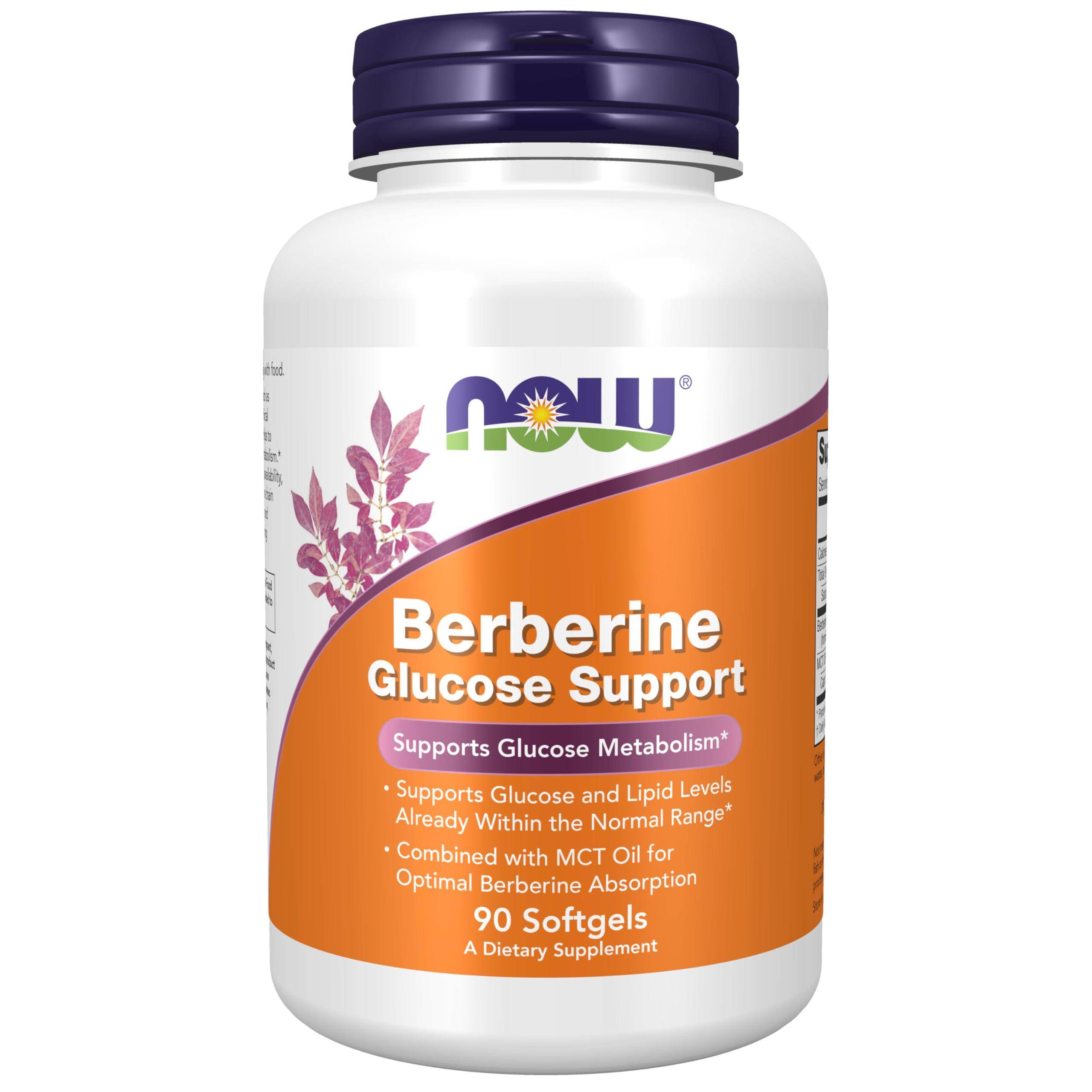
Choosing the Right Berberine Supplement: what to Look For
When navigating the array of berberine supplements available today, it’s essential to prioritize quality and efficacy. Start your search by examining the product label for the following key aspects:
- Purity: Choose a supplement that contains a high concentration of berberine, ideally 500 mg or more per serving. Look for brands that specify the amount of active ingredient on the label.
- Bioavailability: Due to berberine’s natural variability in absorption, consider formulations that include additional ingredients aimed at enhancing bioavailability, such as piperine or curcumin.
- Certification: Opt for products that are third-party tested for quality and potency. Certifications from organizations like GMP (Good Manufacturing Practices) or NSF international can provide extra assurance.
- Additional Ingredients: Some berberine supplements include complementary herbs or nutrients that may support metabolism or gut health. Research these additions to ensure they align with your goals.
Another critical factor to consider in your selection process is the method of extraction used to obtain berberine. those derived from natural sources, such as the Berberis vulgaris plant, tend to be preferred over synthetic alternatives. You can find some products providing clarity about their extraction methods, which can affect the quality and efficacy of the final supplement.
Formulation matters. Berberine supplements come in various forms, including capsules, powders, and liquid extracts. The choice often boils down to personal preference; however, consider these points when selecting a format:
- Capsules: Convenient for on-the-go use; typically mask the taste.
- powders: Versatile for mixing into smoothies or beverages but may require measuring.
- Liquids: Often have faster absorption but can have an unpleasant taste.
Pricing is also a crucial factor as it can reflect the quality of ingredients and manufacturing practices. Although selecting a lower-cost option can be tempting, be cautious. Here’s a simple comparison table to keep in mind when balancing quality and cost:
| Price Range | Quality Indicators | Examples |
|---|---|---|
| Under $20 | Low potency & unverified sources | Unsustainable |
| $20 – $40 | Moderate potency & some certifications | Mid-range products |
| Above $40 | High potency, third-party tested | Premium brands |
It’s also advisable to read reviews and testimonials from actual users to gain insight into potential side effects or benefits experienced. Community feedback can point you towards effective formulations and away from those that may not deliver the promised results. Look for trends in comments about effectiveness and any additional health advantages noted by users; this can guide your choice towards the berberine supplement best suited to your weight loss journey.
Consulting Healthcare Professionals: A Guide for Safe Use
When considering the addition of berberine to your weight loss regimen, it is vital to have an informed discussion with healthcare professionals. Their expertise can provide tailored advice based on individual health needs and conditions. Before beginning any supplement, particularly one that affects metabolism and blood sugar levels, consulting a physician can help uncover potential interactions and contraindications. This initial step can ensure that your approach to weight management is both effective and safe.
During your consultation, discuss your medical history and current medications. berberine can interact with various drugs, especially those for diabetes, and may enhance their effects. It’s important to mention:
- any chronic conditions you may have
- other supplements or over-the-counter medications you are currently taking
- Any allergies or sensitivities
Another aspect to highlight is your lifestyle. Share your daily habits, including your diet, exercise routines, and sleep quality. This information not only helps healthcare providers assess your suitability for berberine but can also lead to more comprehensive weight loss strategies that include dietary adjustments and physical activity tailored for you.
Many healthcare professionals may recommend starting with a low dose of berberine before gradually increasing it. This method allows your body to adjust and helps to monitor any potential side effects, such as gastrointestinal distress. Pay attention to how your body responds and communicate any concerns with your provider. Adjustments can be made based on your experience, individual tolerance, and progress towards your weight loss goals.
Lastly, keep in mind that monitoring your progress during the weight loss journey while using berberine is critical. schedule follow-up appointments to discuss changes, lab tests, or the need for dosage adjustments. Tracking metrics such as weight, body measurements, and even blood sugar levels, if applicable, can give vital insights. Your healthcare professional can suggest the best approach for ongoing monitoring to ensure that berberine contributes positively to your health and weight loss efforts.
Future Research directions: The Evolving Landscape of Berberine Studies
The ongoing research surrounding berberine is diversifying,unraveling further complexities related to its mechanisms and applications in weight loss and beyond. As scientists delve deeper,a multitude of potential areas is emerging that warrant exploration. The intersection of berberine with metabolic health, inflammation, and gut microbiome influences could yield new insights that may redefine therapeutic approaches not only for obesity but also for associated metabolic disorders.
Future studies may pivot towards understanding the synergistic effects of berberine when combined with other natural compounds. This includes exploring how berberine might interact with well-known supplements, such as:
- Green tea extract
- Curcumin
- Garcinia cambogia
- Probiotics
Each of these components has shown promise in individual weight management strategies; together, they might enhance berberine’s efficacy, paving the way for more holistic approaches to weight loss.
In addition, the role of genetic predisposition in individuals’ responses to berberine is an exciting area of investigation. Future research could focus on how different genetic profiles might influence the effectiveness of berberine for weight loss. This could involve:
- Identifying specific genetic markers
- Examining personalized dosage strategies
- Assessing long-term efficacy across diverse populations
This genetic exploration may eventually lead to tailored weight loss interventions, maximizing the benefits of berberine for various demographic segments.
Furthermore, innovative methodologies such as longitudinal studies and clinical trials that monitor participants over extended periods can significantly deepen our understanding of berberine’s long-term effects. Such research could evaluate not just weight loss,but also improvements in metabolic health indicators like:
| Health Indicator | Measurement Before Berberine | Measurement After Berberine |
|---|---|---|
| Blood Sugar Levels | High | Normal |
| Cholesterol Levels | High | Low |
| Weight (lbs) | 200 | 180 |
This type of research is crucial for establishing the full spectrum of berberine’s benefits,providing evidence-based recommendations for its use in various clinical settings.
the inquiry into natural delivery systems for berberine, such as nano-encapsulation or liposomal formulations, is emerging as a vital field. These advanced delivery systems can potentially increase the bioavailability and absorption of berberine in the body, enhancing its therapeutic effects. Investigating how these formulations affect weight loss outcomes could significantly shift current product formulations, making berberine more effective for weight management and overall metabolic health.
Q&A
Q: What is berberine, and where does it come from?
A: Berberine is a natural compound extracted from several plants, including the barberry, goldenseal, and Chinese goldthread. It has been used in traditional medicine for centuries, thanks to its potential health benefits, including its anti-inflammatory and antimicrobial properties.
Q: How does berberine aid in weight loss?
A: Berberine is thought to support weight loss through multiple mechanisms. It enhances insulin sensitivity, which helps regulate blood sugar levels and reduces cravings. Additionally, it may activate an enzyme called AMP-activated protein kinase (AMPK), which plays a crucial role in metabolism and can promote fat burning.
Q: Are there scientific studies backing the claims of berberine for weight loss?
A: Yes, several studies have explored the effects of berberine on weight loss. Research indicates that individuals taking berberine experience a notable reduction in body weight, body mass index (BMI), and fat mass. Though, more extensive trials are needed to fully understand its efficacy and long-term effects.
Q: Is berberine safe to use for weight loss?
A: While berberine is generally considered safe for most people when taken in recommended doses, it is indeed essential to consult with a healthcare professional before starting any supplement regimen, especially for those with existing health conditions or those taking medications. Potential side effects include gastrointestinal discomfort, diarrhea, and constipation.
Q: How should berberine be taken for optimal weight loss results?
A: Berberine is typically available in capsule or powder form, and the recommended dosage varies. Many studies have used doses ranging from 900 to 1,500 mg per day, divided into two or three doses taken with meals. Consistency and adherence to a balanced diet and regular physical activity are crucial for maximizing results.
Q: Can berberine replace a healthy lifestyle for weight loss?
A: While berberine can be a helpful supplement in a weight loss journey, it should not be seen as a magic solution. A sustainable weight loss strategy incorporates a balanced diet, regular exercise, and a healthy lifestyle. Berberine may enhance these efforts, but lasting change typically requires a holistic approach.
Q: Who should avoid taking berberine?
A: Individuals who are pregnant, breastfeeding, or have specific health conditions such as low blood sugar, liver problems, or those taking certain medications (such as blood thinners) should avoid berberine or consult a doctor before use. it’s always better to err on the side of caution when considering any supplement.
Q: What are alternative methods for weight loss that don’t involve supplements like berberine?
A: There are myriad natural ways to promote weight loss without supplements. these include adopting a balanced diet rich in whole foods, engaging in regular physical activity, practicing mindful eating, ensuring adequate sleep, and managing stress levels.Each individual’s journey is unique, and it’s critical to find what works best for you.
Q: Are there any tips for choosing a high-quality berberine supplement?
A: When selecting a berberine supplement, look for products that undergo third-party testing for quality and purity. Check labels for standardized berberine content and avoid those with needless fillers or additives. Researching brands and reading reviews can also help ensure you choose a trusted product.
—
Q: What should someone expect when taking berberine for weight loss?
A: Users often report changes in appetite regulation, reduced cravings, and gradual weight loss over time when incorporating berberine into their regimen. However,responses can vary; some may notice significant shifts more quickly than others.Patience and consistency are key, as individual results may depend on various factors, including diet and lifestyle.
closing Remarks
berberine emerges as a fascinating compound in the quest for effective weight management. Its multifaceted approach—enhancing metabolism, regulating glucose levels, and promoting gut health—illustrates its potential beyond mere supplementation. However, as with any health strategy, individual results may vary, and it’s crucial to approach berberine with a blend of curiosity and caution. Consulting healthcare professionals before embarking on any new regimen is advisable, especially for those with pre-existing conditions or those taking medications. As the scientific community continues to unravel the intricacies of berberine’s effects, one thing remains clear: integrating informed choices with a balanced diet and regular exercise may be the true key to achieving and maintaining a healthier weight. The journey toward well-being is a personal one, and with the right tools and knowledge, you can navigate it with confidence.
